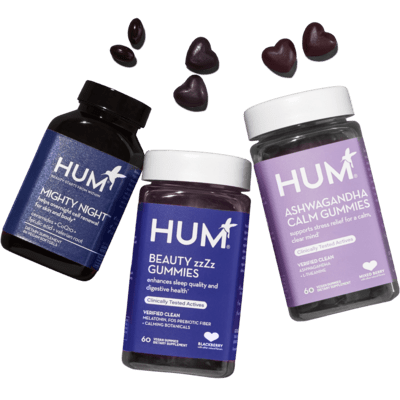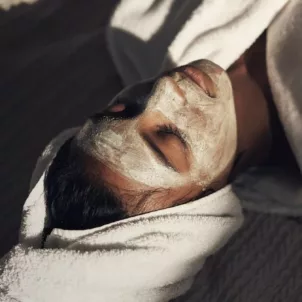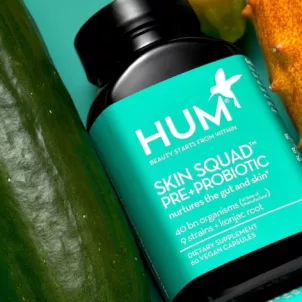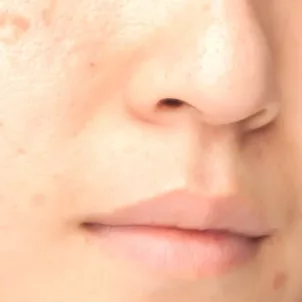Medically Reviewed By
Gaby Vaca-Flores, RDN, CLE
Registered Dietitian Nutritionist
The link between diet and acne has long been clouded in controversy. Doctors, dermatologists, researchers, and individual consumers are on both sides of the debate. So HUM looked at our own data to see what we could find about the role healthy habits play on breakouts. And oh, were we surprised by some of the results!
We looked at a sample of 1,000 HUM consumers, mainly women aged 18-34. We analyzed their behaviors to find the habits most commonly linked with acne and breakouts. See what we found below and be ready for some unexpected outcomes!
 Sammy DeVincent took to Instagram to share her before-and-after journey with HUM.
Sammy DeVincent took to Instagram to share her before-and-after journey with HUM.
 Ryan Potter, who you may know as the voice of Hiro from Disney’s Big Hero 6, shared his struggles with acne—and his HUM solutions—on Twitter.
Ryan Potter, who you may know as the voice of Hiro from Disney’s Big Hero 6, shared his struggles with acne—and his HUM solutions—on Twitter.
 Are you to transform your skincare routine and start within?
Are you to transform your skincare routine and start within?
 A HUM study on Acne
A HUM study on Acne
We looked at a sample of 1,000 HUM consumers, mainly women aged 18-34. We analyzed their behaviors to find the habits most commonly linked with acne and breakouts. See what we found below and be ready for some unexpected outcomes!
Our Methodology
We divided our sample of 1,000 into two pools based on direct consumer-lifestyle responses: those who reported they were prone to breakouts, and those who said they were not. The total split 53% into the acne-prone group and 47% into the group without acne concerns. We then analyzed the behaviors of each pool to find which habits were more prevalent among the acne-prone population.Our surprising Findings on Habits and Acne
We found some fascinating information revealing trends that link health and nutrition habits to breakouts. It’s important to note that these links don’t imply causation (i.e. there’s no evidence that the habit is the direct or sole cause of breakouts). However, the information presented reveals some truly interesting correlations. With further research, these trends could pave the way for some groundbreaking discoveries about the role of nutrition in acne and skincare.Sugar, Dairy, and fat
Let’s start with a look at the bottom of the chart below. Ice cream (23), cookies (22), and milk (20) are the worst habitual offenders of those struggling with acne. (Don’t worry, we’ll get back to #21 in a moment!) Ice cream in particular shows 29% of those with breakouts indulge regularly, compared to 19% of those with clear skin. This finding reveals a 34.5% improvement rate in those that don’t make ice cream a habit! It makes sense since these three treats contain the duo most terrible for skin: processed fat and sugar. Sugary foods cause your blood sugar to surge, which triggers a burst of the hormone insulin, which is responsible for helping your cells absorb the sugar. Insulin is thought to instigate sebum production, which can lead to a build-up of dead skin cells that clogs the pores and instigates breakouts. The best advice here is to cut out sugary and processed foods as much as possible. Perhaps it’s time to give Ben & Jerry’s the good old fade away…digestion & acne
Also demonstrating a negative relationship with breakouts is bloating (13) and constipation (17), supporting a link between digestion and acne. If you think your acne may be related to gut issues, a probiotic can be a great way to restore healthy bacteria to your gut for clear skin. These good bacteria help keep our pH levels steady. They also regulate the removal of wastes, allowing our bodies to absorb skin-benefiting nutrients. Likewise, cleansing the system to attract and flush out toxins that clog up your system helps rejuvenate your body. Digestive enzymes also help optimize the breakdown of foods. They can help your body absorb healthy nutrients, renew damaged cells, and decrease constipation—all key in supporting clear, glowing skin.Sneaky Healthy Foods Correlated With Acne
But wait a minute: Why would the practice of choosing healthy foods (21) only be so low on the chart? That shocked us too! To explain, let’s look at the role of stress (18) on acne. The connection between stress and acne has been discussed at length. In 2007, Wake Forest University School of Medicine released findings from the largest study ever conducted on acne and stress. The results were telling. Teens who were under high levels of stress were 23% more likely to have increased acne severity. Our study, although with women aged 18-34 rather than teens, followed this trend. About 68% of the acne-prone group reported regular stress compared to 61% of the other group. Scientists can’t say exactly how stress worsens acne. But they do know that cells that produce sebum—the oily substance that mixes with dead skin cells and bacteria—have receptors for stress hormones. Increases in sebum can clog hair follicles on the skin, leading to a pimple or acne cyst. Thus the relationship between choosing healthy foods only and breakouts may be less surprising when considering the stresses of a strict and limiting diet. The answer here isn’t to limit healthy foods, but to ensure that moderation and balance are your reigning principles.So what habits should we adopt?
It makes sense that on the clear-skin side of the spectrum we found regular stress-management practices such as yoga (2) and meditation (1). Our finding that yoga (with a 12.9% improvement rate) and meditation (with the #1 improvement rate of 14.3%) are linked with clearer skin doesn’t stand alone. Scientists looked at a range of psychological treatments—including relaxation sessions, meditation, and cognitive behavior therapy—on skin diseases ranging from psoriasis, eczema, and acne. They found this field of psychodermatology showed real benefits. Tracking 900 participants in 22 studies, they found that psychological therapies aimed at reversing bad habits had the largest effect. Our finding that stress was more prevalent among the acne-prone group while yoga and meditation—psychodermatologic activities—proved beneficial provides additional weight to this theory. While the above relaxation techniques are great habits to adopt for reducing stress-related breakouts, any methods to control your stress levels are helpful. Preventing stress hormones from wreaking havoc on your body will likely benefit your skin. In turn, it’ll support your overall health and wellbeing.Other great habits for skin…
Supplementing your diet can really make a difference. It appears that regularly consuming fish (4) and eggs (5) can be helpful habits for reducing breakouts. Fish contain omega-3 fatty acids, a type of unsaturated fatty acid that may reduce inflammation throughout the entire body. As inflammation worsens the redness and irritation of breakouts, supplementation with fish oil can be especially helpful in soothing and hydrating acne-prone skin. If you pick a fish oil, make sure it’s non-GMO, pure, and potent. Also ensure that it has the clinically studied ratios of EPA and DHA. Additionally, we recommend making sure that your digestion is at its absolute best. A combination of detoxifying plant extracts and powerful greens can be extremely impactful. We recommend combining our best sellers OMG! Omega the Great and Daily Cleanse to encourage clear and calm skin.HUM SUCCESS STORIES
You don’t have to take only our word on the best nutrition habits for clear skin. A major inspiration for this study came directly from the success HUM consumers found for reducing breakouts when they combined the detoxifying nutrients of Daily Cleanse and the anti-inflammatory properties of a pure and potent fish oil in OMG. Here are just a few of our favorites! Will Cook is a freelance makeup artist who stumbled onto HUM in Sephora. Pretty soon, he created a video on HUM’s Daily Cleanse, titled “Natural Acne Remedy!” Will says, “as for active breakouts, I’ve seen a huge improvement in my skin.” Sammy DeVincent took to Instagram to share her before-and-after journey with HUM.
Sammy DeVincent took to Instagram to share her before-and-after journey with HUM.
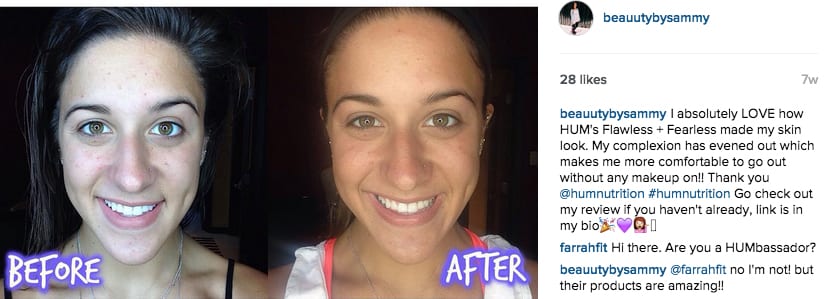 Ryan Potter, who you may know as the voice of Hiro from Disney’s Big Hero 6, shared his struggles with acne—and his HUM solutions—on Twitter.
Ryan Potter, who you may know as the voice of Hiro from Disney’s Big Hero 6, shared his struggles with acne—and his HUM solutions—on Twitter.
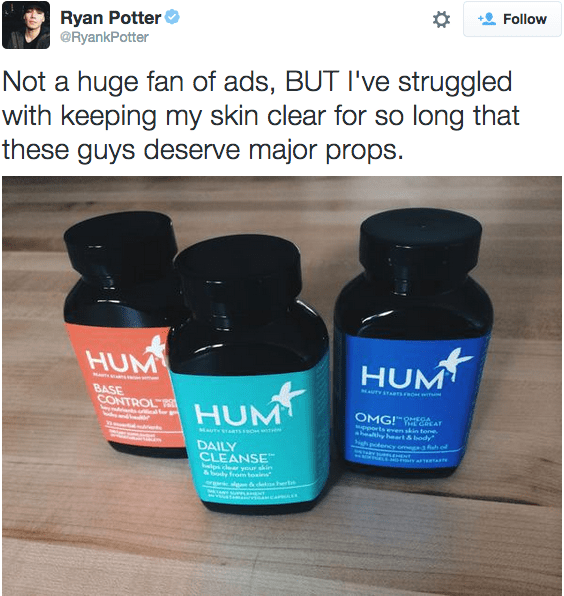 Are you to transform your skincare routine and start within?
Are you to transform your skincare routine and start within?
More like this
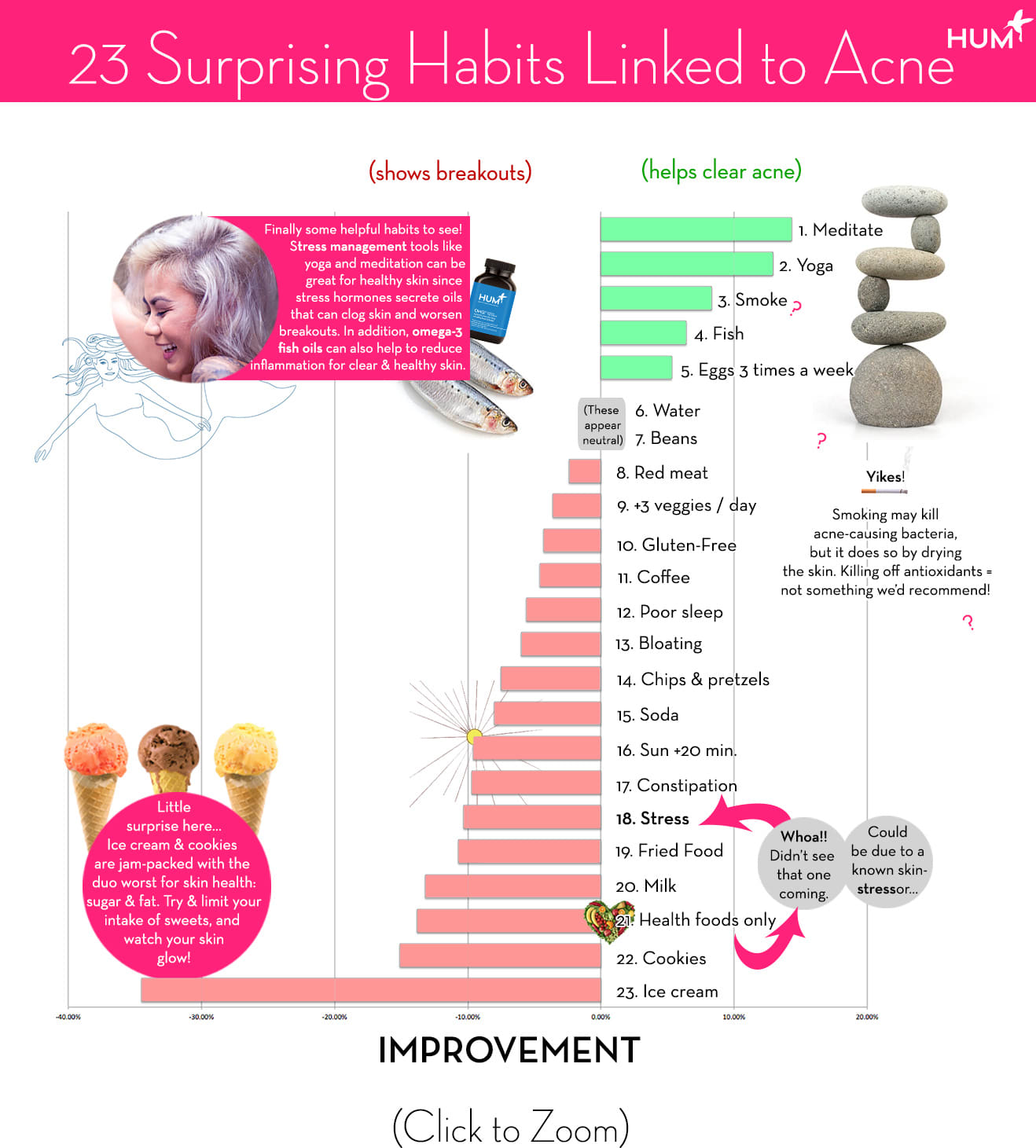 A HUM study on Acne
A HUM study on Acne